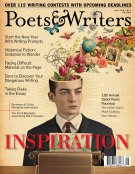Other than your interest in a particular author, what sorts of things influence you when selecting a book for coverage? Do relationships with editors and/or publicists help? What about blurbs, prepub reviews, the size of an advance?
There are definitely publishers and publicists I pay close attention to. If a book is published by Riverhead, Knopf, Two Dollar Radio, Melville House, Deep Vellum, FSG, and so many others, there’s a good chance it’s going to be great. I don’t pay attention to blurbs and I don’t read prepub reviews, and I generally have no idea how much money the authors have gotten for the books—when you’re not in New York, you’re kind of insulated from publishing gossip, which is a blessing. But mostly I look for interesting voices, either established or new, from a variety of different backgrounds. It’s unscientific, I guess, but some books just kind of grab you.
You review both fiction and nonfiction. Do you have a preference for one over the other?
I honestly don’t, although I end up reviewing more fiction—I’m not sure why that is. Maybe I do have a preference, actually, and I just don’t want to admit it and hurt nonfiction’s feelings. It’s a very delicate genre, and I don’t want it to feel slighted.
How many books do you read each week for work?
I probably read about two or three a week for work, even if they’re not all ones I’m reviewing—if I’m writing about a book, I like to read as much as I can of the author’s other work before doing the review, just to have some context. As a result, I have very little time for pleasure reading, so I’ve got a to-be-read pile that’s basically two bookshelves at this point. I dream of catching up with all of them on vacation someday. So as soon as I can afford to take seven years off, that’s what I’ll be doing.
For Jacket Copy, you do a great deal of reporting on of-the-moment literary issues, which was something you also did for years on Bookslut’s blog. Are you basically on call for these types of pieces or do you propose topics for reportage?
For those posts I send Carolyn Kellogg, my amazing editor there, a list of possible stories, and she’ll let me know which one she’d like me to write about. There’s almost never a shortage of interesting literary stories, so it’s usually easy to find some good topics. Except August, when the publishing industry goes to sleep for a whole month. Dear God, I hate August.
I get the sense that you not only enjoy using Twitter but revel in it. Other than its entertainment value, how useful to you has it been in your career as a book critic?
I do love Twitter, God help me. For me, it’s been a great way to make connections, not just with editors, but with other journalists who cover the same beat that I do. And I’ve made a lot of friends through Twitter, which is kind of weird at first, but it beats the way I used to make friends—going up to strangers at the supermarket and asking them what they think about Jonathan Franzen. I have gotten kicked out of so many supermarkets that way.
The media landscape has changed considerably since those early heady days when blog was still a relatively new word. Do you feel any sort of nostalgia for them?
I feel nostalgia for pretty much everything, the litblog world included. At the time, it seemed like we were doing something new and democratic and fun, and there were so many great voices doing blogs—Maud Newton, Mark Sarvas, Gwenda Bond, Laila Lalami, and so many others. But they’ve all gone on to do such great work, and now there’s Twitter, which has kind of opened up the world even more, so I’m happy with how things are. I do miss the blogs, though.
Do you have a favorite book review you’ve written?
Oh, my reviews are like my children—I forget about them as soon as I send them away. No, seriously, three come to mind. I reviewed Barry Hannah’s Long, Last, Happy: New and Selected Stories and Kristin Hersh’s Don’t Suck, Don’t Die: Giving Up Vic Chesnutt for NPR, and I was happy with the way those came out. I’m also fond of a review I did of Charles D’Ambrosio’s Loitering: New and Collected Essays for the Portland Mercury. That was assigned to me by my friend Alison Hallett, who was running book coverage there at the time, and I loved the book and I loved writing the review.
Where do you see the future of book coverage in ten years?
A Trump presidency has turned America into a vast wasteland, and killer robots roam the streets freely, shooting anyone who—wait, sorry. That’s the answer to another question. I’m actually optimistic about the future of book coverage; I think more publications are going to realize that they need to have a robust book section to draw in readers. I make fun of millennials on Twitter sometimes, but it actually seems like that generation cares deeply about literature, so I think they’re going to demand more reviews, more features, more interviews. I’m cynical about a lot of things, but not about the future of literature. Maybe I’ll be proved wrong, but I doubt it.
What books that you aren’t reviewing are you most looking forward to reading in the near future?
There are so, so many, but off the top of my head: The Turner House by Angela Flournoy; The Speechwriter: A Brief Education in Politics by Barton Swaim; Welcome to Braggsville by T. Geronimo Johnson; A Little Life by Hanya Yanagihara; and M Train by Patti Smith.
Michael Taeckens has worked in the publishing business since 1995. He is a cofounder of Broadside: Expert Literary PR (broadsidepr.com).









